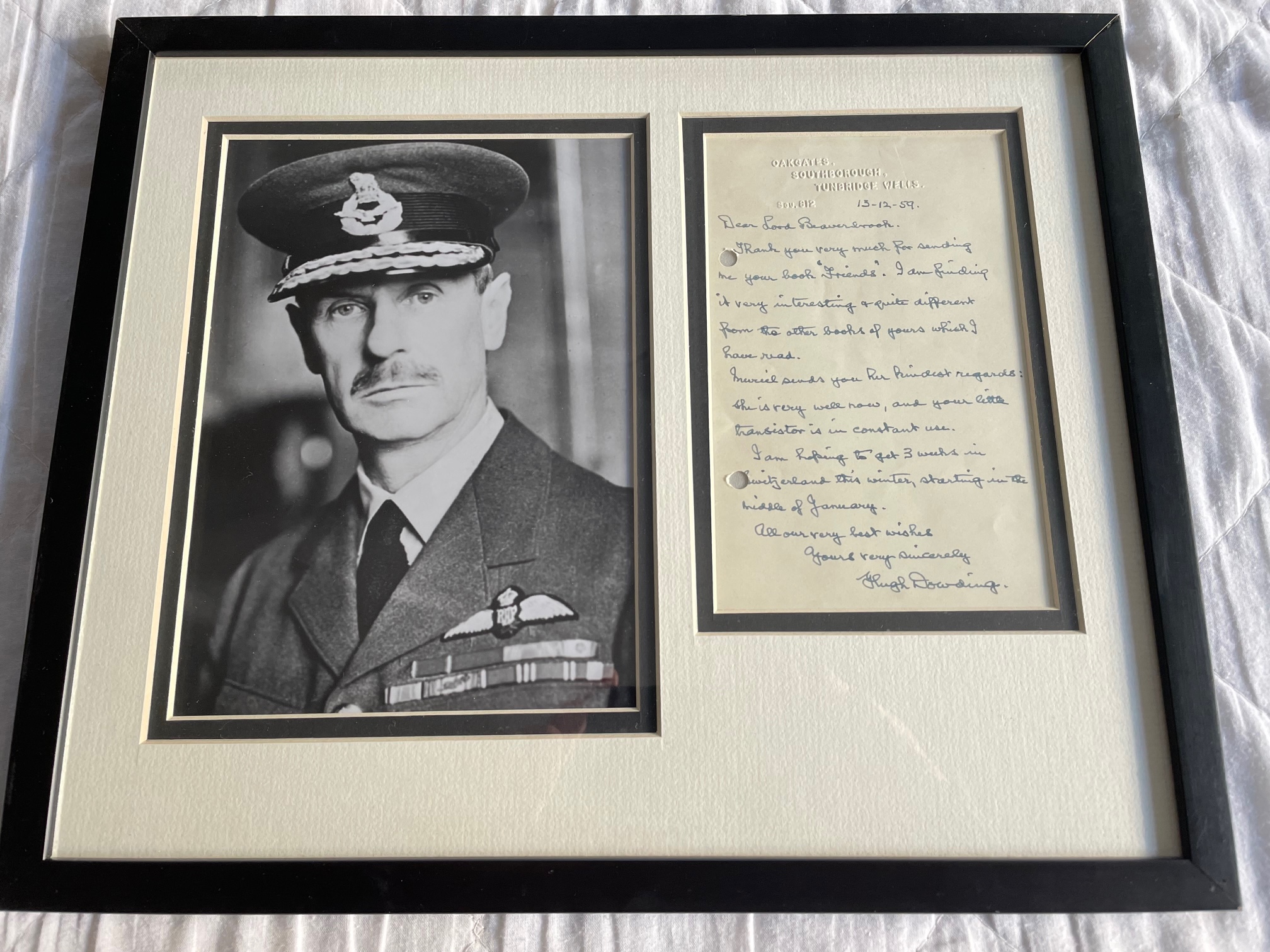LORD HUGH DOWDING PHOTO AND SIGNED LETTER

| LORD HUGH DOWDING PHOTO AND SIGNED LETTER | |
(Signatures) |
Marshal of the Royal Air Force , the Legendary Leader of Fighter command during the Battle of Britain ' Lord Hugh Dowding ' |
(Dimensions) |
370mm x 300mm Photo with Mounted Hand Written Signed letter |
| Price | £2495.00 |
Description
Air Chief Marshal Hugh Caswall Tremenheere Dowding , 1st Baron Dowding GCB, GCVO, CMG (24 April 1882 to 15 February 1970) was a British officer in the Royal Air Force. He was the commander of RAF Fighter Command during the Battle of Britain. Due to retire in June 1939, Dowding was asked to stay on until March 1940 because of the tense international situation. He was again grudgingly permitted to continue, first until July and finally until October 1940. Thus he fought the Battle of Britain under the shadow of retirement. In 1940, Dowding, nicknamed "Stuffy" by his men, proved unwilling to sacrifice aircraft and pilots in the attempt to aid Allied troops during the Battle of France. He, along with his immediate superior Sir Cyril Newall, then Chief of the Air Staff, resisted repeated requests from Winston Churchill to weaken the home defence by sending precious squadrons to France. When the Allied resistance in France collapsed, he worked closely with Air Vice-Marshal Keith Park, the commander of 11 Fighter Group, in organising cover for the evacuation of the British Expeditionary Force at Dunkirk. Through the summer of 1940 in the Battle of Britain, Dowding's Fighter Command resisted the attacks of the Luftwaffe. Beyond the critical importance of the overall system of integrated air defence which he had developed for Fighter Command, his major contribution was to marshal resources behind the scenes (including replacement aircraft and air crew) and to maintain a significant fighter reserve, while leaving his subordinate commanders' hands largely free to run the battle in detail. At no point did Dowding commit more than half his force to the battle zone in Southern England. Fighter Command pilots came to characterise "Stuffy" Dowding as a distant figure, but one who cared for his men and had their best interests at heart. Dowding often referred to his "dear fighter boys" as his "chicks". Indeed his son Derek was one of them: He was a pilot in 74 Squadron. Because of his brilliant detailed preparation of Britain's air defences for the German assault, and his prudent management of his resources during the battle, Dowding is today generally given the credit for Britain's victory in the Battle of Britain. Dowding's subsequent downfall has been attributed to his prickly temperament and lack of diplomacy and political savoir faire in dealing with intra-RAF challenges and intrigues, most obviously the Big Wing controversy in which a number of senior and active service officers argued in favour of large set-piece air battles with the Luftwaffe as an alternative to Dowding's successful Fabian strategy. Another reason often cited for his dismissal is the inability of Fighter Command under his leadership to counter German nighttime bombing raids on British cities. The account of radar pioneer, E. G. Bowen in Radar Days (1987) rebuts the claim that Dowding's perception of the problems of British night fighters was inadequate. He suggests that if Dowding had been left to follow his own path, the ultimately effective British response to night bombing (which depended completely on developments in air-borne radar) would have come somewhat sooner. Dowding himself showed that he had a good grasp of night fighter defence and was planning a defence system against night bombing in a letter he wrote some time after the Battle of Britain. The new Chief of the Air Staff, Air Chief Marshal Charles Portal removed Dowding from his post in November 1940, and replaced him with his ambitious rival (and one time Big Wing advocate), Sholto Douglas. After his dismissal, he was told he might make himself useful "by investigating service waste". Dowding was made a Knight Grand Cross of the Order of the Bath. Publication of his book, Twelve Legions of Angels, was suppressed in 1942. The British Government considered that it contained information which might be of use to the Germans. The book was finally published in 1946, soon after the war ended...This is a lovely framed famous photograph of Dowding during the Battle of Britain and comes with a mounted hand written and signed letter by Dowding himself written in 1959 to Lord Beaverbrook on his own embossed headed paper...It reads : Dear Lord Beaverbrook , Thank you very much for sending me your book " Friends ". I am finding it very interesting and quite different from the other books of yours which I have read. Muriel sends you her kindest regards . she is very well now , and your transistor is in constant use. I am hoping to get 3 weeks in Switzerland this winter , starting in January. All our very best wishes , Yours very sincerely , Hugh Dowding...priced @ £2495.00...To complement the purchase of your picture/photo , we are now able to offer a professional Picture Framing service. For further details please contact us by phone or email.
Legends Aviation Gallery
Email: colin@legendsaviationgallery.co.uk
Contact: 07976 298770 or 01474 369185
Why not visit our showroom:
Legends House, Former RAF Gravesend, Gavel Cottage, Thong Lane, Thong Village, Shorne, Kent, DA12 4AD



